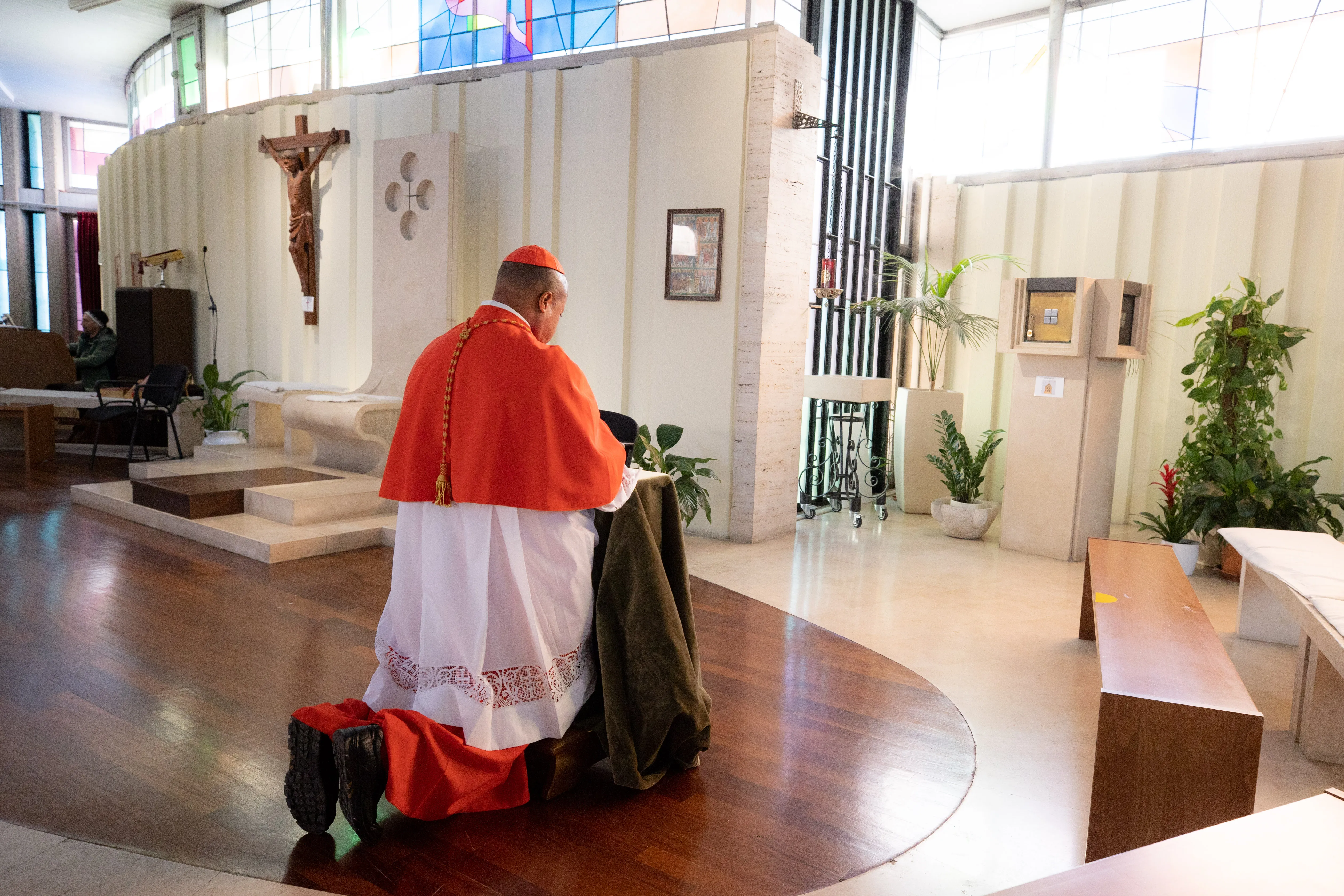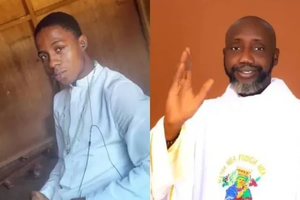Nigeria’s Newest Cardinal: Presidential Election Will ‘Either Make or Break Nigeria’
In Cardinal Okpaleke’s Lenten message for his diocese, he emphasized the responsibility that Nigeria’s many young voters — 40% of newly registered voters are students — have in this election.

With Nigeria’s escalating violence, a lot is at stake in the presidential election this week in Africa’s most populous country, according to a Nigerian cardinal.
In an interview with CNA, Cardinal Peter Ebere Okpaleke said that the next president of Nigeria will be faced with the “hydra-headed” challenge of insecurity and violence.
An Islamist insurgency in the Northeast, kidnappings for ransom by criminal gangs in the Northwest, violence by separatist gunmen in the southeast, and an ongoing conflict between Fulani herdsmen and farmers in the North all reflect “the progressive failure of the state to secure the life and property of her citizens.”
In all, at least 10,000 Nigerians were killed in armed conflict last year and more than 5,000 people were kidnapped, according to the International Crisis Group.
“Nigeria seems to be at the brink,” said Cardinal Okpaleke, who leads the southern Nigerian diocese of Ekwulobia. “Things have fallen apart at the social, cultural, and political levels.”
As voters head to the polls on Feb. 25 to decide who will replace President Muhammadu Buhari, many believe that “this election will either make or break Nigeria.”
“Purposeful leadership is needed to restore trust and confidence in the Nigerian state,” the cardinal said.
Violence is a Hydra-Headed Problem
Whoever wins the election among the 18 candidates vying for the presidency will need to address “the structural sociopolitical and economic issues that are fueling the escalation of violence” in Nigeria, Cardinal Okpaleke said.
“There have been religious conflicts in Nigeria dating back decades between the Christians and the Muslims,” he explained.
Nigeria’s population of more than 225 million people is 53% Muslim and 46% Christian, according to the CIA World Factbook.
“There has also been a proliferation of firearms due to porous border control,” the cardinal added.
In the North, Fulani herdsmen who grazed their cattle in the Lake Chad basin have been moving southward on “a collision course with the agriculturalists of the Middle Belt Area and the whole people of the South,” the cardinal said.
“The handling of this farmer-herder conflict by the federal government of Nigeria seems to show that the herdsmen, who are mainly of the Fulani extraction, had the tacit support of some people in government,” he said, adding that there is “suspicion of a Fulani agenda to take over Nigeria and Islamize the country.”
“Against this background, the Boko Haram and other terrorist organizations operating in Nigeria appeared to be tools for the achievement of the goal of destabilization and takeover by the Fulani of the territory, Nigeria, from the indigenous peoples,” Cardinal Okpaleke said.
On Pentecost Sunday last year, the Islamic State West Africa Province was responsible for an attack on St. Francis Xavier Catholic Church in Nigeria’s southwest Ondo state that killed at least 40 people, according to government authorities.
The cardinal pointed out that the violence in Nigeria not only affects Christians.
“There is so much violence and insecurity in the country,” he said. “In my opinion, the violence is not directed specifically against priests or the Christians. Having said that, it has to be acknowledged too that in some parts of the country, depending on what is stoking the conflict, priests or the Christians often stand in the line of direct attack.”
Four Catholic priests were killed last year in Nigeria and 28 priests were kidnapped, according to the pontifical charity Aid to the Church in Need, with more than 7,600 Christians killed in Nigeria between January 2021 and June 2022.
Poverty Capital of the World
Nigeria was declared “the poverty capital of the world” by the World Bank in 2016. Cardinal Okpaleke has seen how this economic crisis has been “matched with an increase in crime.”
“With a police force that has been stretched thin and seemingly lacking morale, criminals and bandits who kidnap for ransom had a field day,” he said.
Today double-digit inflation in Nigeria is at the highest it has been in nearly two decades, according to The Economist.
In one of Buhari’s last acts as president, the leader introduced a redesign of Nigeria’s currency, which has resulted in a currency crisis with lines at ATMs so long that some people are sleeping outside of banks as millions of people are left without the money needed for basic necessities.
On Tuesday, The Guardian reported that critically ill patients have been left untreated and have died as families struggled to get cash to pay for medical treatments amid the severe cash shortages.
“To say that the scarcity of the new currency is causing challenges for the people is an understatement,” the cardinal said.
“A lot of people are going through hell. Economic activities have almost ground to a halt.”
‘Embodying the Hopes of the People’
Nigeria’s 93.4 million registered voters are faced with the question of deciding “which of the presidential candidates has the vision, character, competence, and commitment to engender the energy that comes from hope, Cardinal Okpaleke said.
Among the 18 candidates, three are viewed as the frontrunners in the presidential race: Bola Ahmed Tinubu, Atiku Abubakar, and Peter Obi.
Tinubu from the ruling All Progressives Congress party and Abubakar from the opposition People’s Democratic Party are both Muslims. One Muslim cleric made headlines in Nigeria calling the All Progressives Congress party ticket “a call to jihad.”
Obi, a Catholic candidate running on a reform agenda for the newly created Labour Party, has urged voters not to vote along ethnic or religious lines.
Official election results are expected by March 1, according to Reuters. To win the election, a candidate needs at least one quarter of the vote in two-thirds of Nigeria’s 36 states or the election will continue with a runoff between the top two candidates.
The cardinal underlined his concern that if the declared winner is not perceived as “embodying the hopes of the people” then “the despair could unleash negative forces that will lead to a further deterioration of an already bad situation.”
In Cardinal Okpaleke’s Lenten message for his diocese, he emphasized the responsibility that Nigeria’s many young voters — 40% of newly registered voters are students — have in this election.
“Never have I seen an election in which many Nigerians, especially the youth, are as invested as in the forthcoming one,” the cardinal said.
“As we are marked with the ash and reminded that dust we are and to dust shall we return, may we realize the great privilege God has given us to contribute in shaping history,” he said.
This is part 2 in a two-part series of articles based on an interview with Cardinal Peter Ebere Okpaleke. In part 1, the cardinal shared what he sees as some of the key factors behind why Nigeria has the highest Mass attendance in the world.
- Keywords:
- nigerian christians

















